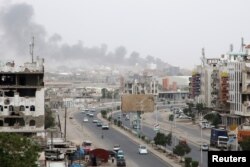Southern Yemeni separatists control large chunks of the southern interim capital of Aden and continue to lay siege to the presidential palace.
Amateur video shown Wednesday on Arab TV showed forces loyal to internationally recognized President Abd Rabu Mansour Hadi moving troops from the coastal port of Mukha to the southern capital of Aden to reinforce garrisons that remain loyal to the government.
Southern separatists captured large parts of Aden over the past 72 hours, amid scattered fighting that left dozens dead or wounded.
Yemeni analyst Ahmed Salah, who heads the Aden Center for International Relations, told Al Hurra TV that forces loyal to Hadi had defected to the separatist movement in many places and that some southerners were angry that Hadi's men had killed civilians with field artillery and mortars, in addition to damaging the city’s water infrastructure.
Good news, bad news
Saudi-owned Al Arabiya TV reported that forces loyal to Hadi had recaptured the Yemeni Army’s Fourth Brigade military garrison in Aden, which had recently fallen to the separatists. Other Arab media indicated that Hadi’s prime minister remained besieged inside the Maisheeq Presidential Palace, although Arabiya TV said “he and his ministers continue to exercise their functions.”
Arab analysts said that the Saudi-led coalition’s junior partner, the United Arab Emirates, which has a strong military presence in and around Aden, was supporting the southern Yemeni separatists under the command of Aiderous al Zubeidi.
Zubeidi told Arab media the residents of southern Yemen were unhappy with the government of Prime Minister Ahmed Ben Dagher and wanted him replaced.
He said that living conditions had deteriorated in southern Yemen because of the poor performance of the government, and he added that he had asked Hadi to replace Dagher and his ministers with a new Cabinet of technocrats.
Zubeidi went on to say that he would negotiate his movement’s demands with Hadi and other Yemeni political forces. British Foreign Secretary Boris Johnson has reportedly proposed giving the southern separatists 50 percent representation in a joint confederation with the north of the country. Aden was a British crown colony until 1967.
Unstable situation
University of Paris political science professor Khattar Abou Diab told VOA that Saudi Arabia and the United Arab Emirates have differing views about Aden, but the situation could be unstable for some time to come.
He pointed out that some influential Saudi power brokers had floated the idea of having a Yemeni government in the south of the country and another government in the north of the country, under the aegis of Hadi. He noted that Saudi Arabia was concerned about being bogged down in Yemen for a long time to come, because of the conflict in the north with the Houthi militia (backed by Iran), and might be looking for a simple resolution to the conflict.
Abou Diab warned that such a solution, involving a Yemeni confederation, could open the door to other latent conflicts over influence in the various regions of the country.
Neighboring Oman as well as the United Arab Emirates, which supports the southern separatists, are reported to have competing economic interests in different parts of the south.





